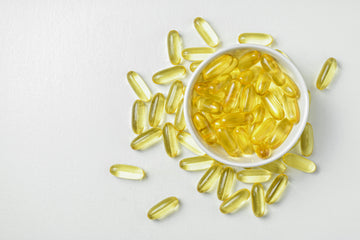Omega-3 fatty acids are essential nutrients that offer numerous health benefits, from supporting heart health to improved brain function to anti-inflammatory effects. However, many people wonder: When is the best time to take omega-3 for maximum effect? And what else is important when taking it?
Why does the time of intake matter?
The time of day you take omega-3 fatty acids can influence the body's absorption and utilization. Digestion plays a particularly important role: Omega-3 fatty acids are fat-soluble, meaning the body absorbs them best with fatty meals.
The body's own rhythm can also play a role: some studies suggest that taking Omega-3 in the morning promotes mental performance, while taking it in the evening supports regenerative processes.
By taking omega-3 at the right time of day—during or immediately after a fatty meal—you can significantly improve bioavailability and thus maximize its positive health benefits. Regularity is also crucial for long-term effectiveness.
The ideal time of day for Omega-3
The best time of day to take omega-3 is during or immediately after a main meal containing healthy fats. Many people take omega-3 with breakfast or dinner, as these meals usually contain the necessary fats that enhance absorption.
Not only the time of day is crucial, but also that the meal contains at least 5 to 10 grams of fat, for example, from avocado, nuts, fish, or high-quality vegetable oils. Only then can the body efficiently utilize the EPA and DHA fatty acids.
Morning or evening – which is better?
Morning
Ideal for an energy-packed start to the day, Omega-3 capsules can be easily combined with a healthy breakfast, such as yogurt, nuts, or avocado.
In addition, Omega-3 in the morning can contribute to greater mental clarity, better concentration and cognitive performance, which is particularly relevant for people with stressful work periods or intense mental strain.
At evening
Can help regenerate the body overnight and reduce inflammatory processes that often occur more frequently at night.
In addition, some users report that they sleep better when taken in the evening, as omega-3 can have a calming effect on the central nervous system. Taking it in the evening is therefore also a good choice for people with inner restlessness or high stress levels.
Should you take Omega-3 with or without food?
Omega-3 capsules should always be taken with food, ideally with healthy fats such as olive oil, avocado, nuts, eggs or fatty fish to ensure optimal absorption in the intestine.
Taking it on an empty stomach significantly reduces bioavailability, as the body is only able to utilize the fat-soluble fatty acids to a limited extent.
Tip: If you practice intermittent fasting, you should only take Omega-3 during the eating window, together with a fatty meal.
Optimal dosage for best effect
The recommended dosage is usually around 250 to 500 mg of EPA and DHA per day. You can easily obtain this dosage through high-quality omega-3 capsules that contain precisely measured amounts.
For specific applications, such as inflammatory diseases, concentration problems, or increased cardiovascular risk, higher dosages may be beneficial. However, these should always be discussed with a doctor or therapist.
Avoid mistakes when taking the medication
A common mistake is taking the capsules on an empty stomach or with meals that lack sufficient fat content. This significantly reduces the absorption of the fatty acids.
Another mistake is taking them irregularly. Omega-3 fatty acids are most effective when taken daily and continuously over several weeks. This is the only way to keep levels stable in your body and achieve the desired effects.
Scientific evidence on Omega-3 intake
Studies show that regular intake of EPA and DHA can reduce the risk of cardiovascular disease, promote cognitive function, and reduce inflammation in the body.
According to a 2020 study, omega-3 fatty acids contribute significantly to reducing chronic inflammation and sustainably support the health of the brain, eyes, heart and blood vessels.
Positive effects are also being discussed in the area of mental health (e.g. depression or stress reactions).
Frequently Asked Questions
Can you overdose on Omega-3?
Overdose is unlikely if the recommended dosages are followed. Dosages of up to about 3 grams of EPA and DHA per day are considered safe, but higher amounts should definitely be discussed with a doctor.
Possible side effects of very high doses may include digestive problems, bleeding tendencies, or a fishy aftertaste.
Is Omega-3 also suitable for vegans?
Yes, omega-3 fatty acids are also available from vegan sources. Algae oil, in particular, offers an excellent alternative to fish oil because it is rich in EPA and DHA.
Vegans should be careful to choose Omega-3 capsules that are explicitly made from algal oil, and not just ALA (from linseed oil), as this precursor is poorly converted into EPA and DHA in the body.
Are there any interactions with medications?
Omega-3 fatty acids can affect blood clotting. People taking blood-thinning medications should consult their doctor before taking large amounts of omega-3 to avoid potential interactions.
Conclusion: Regularity beats time of day
More important than the exact time of intake is regularity and combining it with a fatty meal. Therefore, choose a time of day that fits well into your daily routine and stick to it consistently.
Your body will benefit in the long term from the anti-inflammatory, heart-protective and mentally enhancing effects of these valuable fatty acids if you consume them correctly.
Sources:
-
Köhler, A., Bittner, D., Löw, A., & Moertl, D. (2020).
Effects of omega-3 fatty acids on inflammation and cardiovascular risk factors. Clinical Nutrition ESPEN, 40, 157-164. https://doi.org/10.1016/j.clnesp.2020.09.019 -
Schuchardt, JP, & Hahn, A. (2013).
Bioavailability of long-chain omega-3 fatty acids. Prostaglandins, Leukotrienes and Essential Fatty Acids, 89(1), 1–8. https://doi.org/10.1016/j.plefa.2013.03.010 -
Gajos, G., Zalewski, J., Rostoff, P., Nessler, J., & Undas, A. (2011).
Reduced thrombin formation and fibrin clot permeability after n-3 polyunsaturated fatty acids supplementation in patients with atherosclerosis. Thrombosis Research, 127(5), e184–e189. https://doi.org/10.1016/j.thromres.2011.02.015 -
Martins, JG (2009).
EPA but not DHA appears to be responsible for the efficacy of omega-3 long chain polyunsaturated fatty acid supplementation in depression: evidence from a meta-analysis. Journal of the American College of Nutrition, 28(5), 525-542. https://doi.org/10.1080/07315724.2009.10719785




